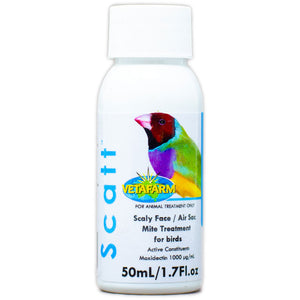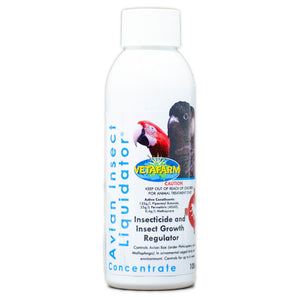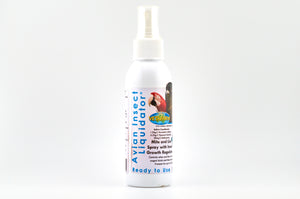Care Of Birds
Health Articles / Information On The Care Of Birds
Nutrition: It is important that the birds diet provide adequate nutrition for growth, reproduction, and resistance to disease. Adequate nutrition is the most important aspect to the overall health of the bird.
Many types of bird diseases can be caused by improper nutrition. Among the principal causes of diseases and death in pet birds is improper diet.
The most common diet for pet birds is a mixture of seeds, not pellets. Long storage times and higher temperatures cause some vitamins in the seeds to lose their potency and thus are not available for use by the bird. Vitamins, especially vitamins A & D are an important part of the birds diet and should be supplemented with one of the Daily Essentials 1,2 or 3, from the BirdCare Co. It is important to supplement B vitamin complex as most of the B vitamin complex is lost when the birds hull their seeds. Seeds are a big part of their diet, along with a good variety of fruits and vegetables. The vitamin B is in the Daily Essentials.
Birds do not have free choice of all available foods as they would have in a natural environment. As a result, they become selective eaters in captivity and vitamin deficiencies develop. This is where using the BirdCare Co. product, Daily Essentials 1,2,.or 3, daily and using Calciboost (liquid calcium) 2 times a week, will help with not having vitamin deficiencies in birds.
Birds react to stress in various ways. The stress of environmental change is extremely hard on birds. Obvious changes in a bird's appearance, posture or personality are signs of stress.
Birds do not adapt to new environments as well as other animals. Stress in birds can be caused by a number of factors, such as shipping, illness, diarrhea, dehydration, hot weather, etc. In all cases, electrolytes are lost. Without replacement of these electrolytes, the bird can go into shock and die. Using the BirdCare Co. product, Guardian Angel, or Energize will help with electrolytes, dehydration, illness, and diarrhea.
Bird diseases are difficult to diagnose, especially by the amateur bird keeper. Observe your bird closely for any signs of illness. Birds hide their problems very effectively. When birds begin to show obvious signs of illness, they are already seriously ill. Ruffled feathers, eyes closing as in a sleeping fashion, sitting low on perches, unusual breathing, sneezing or rasping are indications of respiratory illness.
Please call us for any help you may need in determining what is wrong with your bird. We have many medications and supplements that can help save your bird. If we do not have the answer we will contact the BirdVet and hope that we can get the answer for you.




